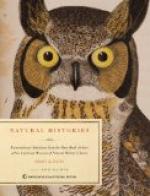One wife, however, does not suffice to fill the nest with eggs; and the stickleback is a firm believer in the advantages of large families. So, as soon as his first mate has laid all her spawn, he sets out once more in search of another. Thus he goes on until the home is quite full of eggs, bringing back one wife after another, in proportion to his success in wooing and fighting. For, like almost all polygamists, your stickleback is a terrible fighter. The males join wager of battle with one another for possession of their mates; in their fierce duels they make fearful use of the formidable spines on their backs, sometimes entirely ripping up and cutting to pieces their ill-fated adversary. The spines thus answer to the spurs of the gamecock or the antlers of the deer; they are masculine weapons in the struggle for mates. Indeed, you may take it for granted that brilliant colors and decorative adjuncts in animals almost invariably go with irascible tempers, pugnacious habits, and the practice of fighting for the possession of the harem. The consequence is, with the sticklebacks, that many males get killed during the struggle for supremacy, so that the survivors wed half a dozen wives each, like little Turks that they are in their watery seraglios. Only the most beautiful and courageous fish succeed in gaining a harem of their own: and thus the wager of battle tells in the end for the advantage of the race, by eliminating the maimed, the ugly, and the cowardly, and encouraging the strong, the handsome, the enterprising, and the valiant. This is nature’s way of preventing degeneracy.
In No. 3 the nest is seen full of eggs, and the excellent father now comes out in his best light as their guardian and protector. He watches over them with ceaseless care, freeing them from parasites, and warding off the attacks of would-be enemies who desire to devour them, even though the intruder be several times his own size. The spines on his back here stand him once more in good stead: for small as he is, the stickleback is not an antagonist to be lightly despised: he can inflict a wound which a perch or a trout knows how to estimate at its full value. But that is not all the good parent’s duty. He takes the eggs out of the nest every now and then with his snout, airs them a little in the fresh water outside, and then replaces and rearranges them, so that all may get a fair share of oxygen and may hatch out about simultaneously. It is this question of oxygen, indeed, which gives the father fish all the greatest trouble. That necessary of life is dissolved in water in very small quantities; and it is absolutely needed by every egg in order to enable it to undergo those vital changes which we know as hatching. To keep up a due supply of oxygen, therefore, the father stickleback ungrudgingly devotes laborious days in poising himself delicately just above the nest, as you see in No. 3, and fanning the eggs with his fins and tail, so as to set up a constant current of water through the centre of the barrel. He sits upon the eggs just as truly as a hen does; only, he sits upon them, not for warmth, but for aeration.




